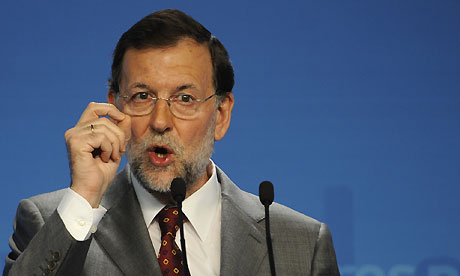User: robin: Eurozone: One bust bank could bring Spain to its knees, warns prime minister | Business | The Guardian
One bust bank could bring Spain to its knees, warns prime minister...

Spanish prime minister Mariano Rajoy during a rare and unexpected press conference on Monday. Photograph: AFP/Getty Images
Spain cannot afford to let a single bank or regional government collapse as that would bring the entire country to its knees, the prime minister, Mariano Rajoy, warned on Monday.
In a rare and unexpected appearance before the press, Rajoy failed to calm markets which had reacted nervously to Spain's biggest-ever bailout, the €23.5bn rescue of Bankia announced on Friday.
"We are not going to let any region or financial entity fall, because otherwise the country would fall," he said.
The cost of Bankia's bailout has spiralled over the past three weeks and a revision of its 2011 accounts over that period has seen losses at parent company BFA multiplied by 100. On Monday night the company was set to report the biggest loss in Spain's banking history – of somewhere above €3.5bn (£2.8bn). It had originally declared just €30m in losses.
Nervousness that other Spanish banks may be hiding similar-sized holes saw Spain's borrowing costs soar once more, with investors demanding 6.5% interest on future 10-year debt. That took the rate dangerously close to the unsustainable levels at which other eurozone countries such as Portugal had to request a bailout.
Bankia, meanwhile, plummeted in value, losing 13% on the Madrid stock market. It has now lost two-thirds of its value since shares were floated last July.
"We took the bull by the horns because the alternative was collapse," said Rajoy, explaining why his government was pumping money into a bank created two years ago by the merger of seven troubled savings banks.
Rajoy claimed pressure on Spain's borrowing costs had more to do with worries over Europe and Greece than Bankia. "There are major doubts over the eurozone and that makes the risk premium for some countries very high," he said. "That's why it would be a very good idea to deliver a clear message there's no going back for the euro."
But as markets were buoyed by an opinion poll showing pro-bailout parties ahead in the runup to Greece's June 17 elections, reducing the risk of it abandoning the euro, the rise in Spain's borrowing costs showed the Bankia bailout was making investors nervous.
Ten-year borrowing costs in Italy stayed a full percentage point below Spain's, while those in already bailed-out Portugal actually fell. Spanish yields, meanwhile, hit their highest level since the dramatic month of November. And while the London stock market rallied slightly, Spain's lost two points. The IBEX index is at a nine-year low.
Rajoy dismissed growing rumours that, as French president François Hollande has predicted, a swath of Spanish banks will need rescuing by Europe's bailout funds. "There will be no rescue of the Spanish banking sector," he said.
Spain's central bank estimates some €180bn of potentially loss-making toxic real estate assets left over from the 2008 housing bust are held by banks. Bankia holds some €32bn of that total.
Rajoy said the government had not yet decided how to raise the €19bn needed to complete the Bankia bailout. Officials say it will probably give the bank a tranche of government debt instead of trying to borrow money itself.
Bankia could then use that as collateral to receive cash from the European Central Bank, shifting part of the rescue burden outside Spain. Government sources say both Germany and Ireland have used a similar system in the past.
Analysts warned, however, that this would make investors even more reluctant to buy Spanish debt. "It sends a signal of a lack of confidence," said Mark Miller of Capital Economics.
A wider audit of Spain's banking system should reveal by June what capital gap other banks will need to fill.
"Events at Bankia will reinforce the view that the upcoming external review should identify a significant recapitalisation need," said analysts at Nomura, who put a sector-wide recapitalisation at more than €50bn.
A recent poll showed that 62% of Spaniards think the country will eventually need some sort of financial rescue package.
Comments
 SaJeDoe
SaJeDoe

